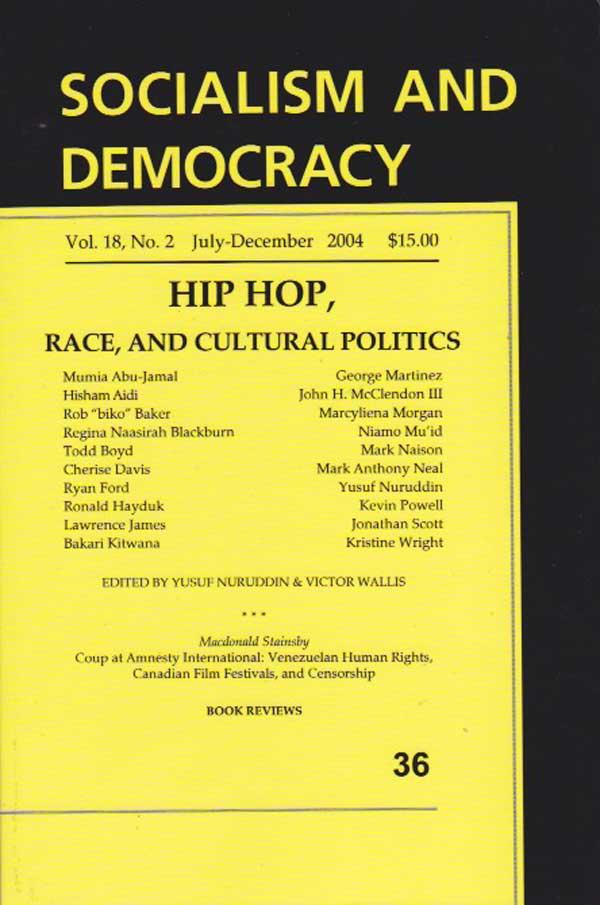Kevin Powell, Who's Gonna Take the Weight? Manhood, Race and Power in America (New York: Three Rivers Press, 2003)
Hip-hop crusader, activist, and cultural critic Kevin Powell, who may be best known as a cast member from the first season of MTV’s The Real World, has written a passionate, brutally honest book, about what it means to be a young black man in America, where you are feared, ignored, powerless and demeaned. In the book’s three essays, Powell grapples with questions like: What is manhood? How does power (or the lack of it) shape a man’s self-definition? What responsibility does the culture of racism, sexism, and violence—glorified in movies, music videos and hip-hop—bear for the current generation of alienated, angry, materialistic, misogynistic young black (and white) men, who revere and emulate popular hip-hop artists like the woman-hating, gangsta wanna-be 50 Cent?
Powell, a former writer for Vibe Magazine, the premiere hip-hop publication, shares that hip-hop culture. Most especially, hip-hop shaped his ideas of manhood and power—and those of his generation. Powell was raised by a poor, hard-working single mom; he describes his dad, who abandoned him at the age of eight, as a “ghost” who had no input on his development. He thus had no other notion of manhood than what he found in hip-hop music. The music carried the message: in the aggressive machismo of the rappers, in the flashy bling-bling of the big cars and platinum jewelry, in the denigration and objectification of women, in the love of violence—all of which offered him clues on how to act like and be a man, and on the nature of power. Powell also points out, however, that while hip-hop culture glorifies violence, materialism and sexism, it is really only a mirror of America’s white patriarchal values.
Powell’s prose is most eloquent when he discusses his personal struggles to overcome his sexism and homophobia, his propensity for violence, and his self-destructive fascination with celebrity culture. Powell shares his disillusionment with the superficiality of fame when he writes: “…we [celebrities] live these terribly pretentious, plastic lives, runaway and runway children, truly, who do not want to grow up, thinking this will go on forever.” For Powell, the party, indeed, did not go on forever. Fired from his high profile job at Vibe (after he loudly challenged the power structure at the magazine), he is soon battling bouts of depression and thoughts of suicide in a rented room in Harlem, devoid of money, possessions and the so-called friends who surrounded him when he was a “celebrity.”
Powell is brave and candid enough to go deep within his psyche to reveal his one-time hatred of women (including his own mother). He recalls how this hatred resulted in his chronic mistreatment of women and in instances of violence against several women (Powell was expelled from Rutgers University after pulling a knife on a female student).
“Nothing in my world, nothing in my self-definition prepared me for dealing with a woman as an equal. My world said women were inferior, that they must at all costs be put in their place…,” he writes.
Powell’s final essay attempts to answer the penetrating question “What is manhood?” by deconstructing the history of hip-hop culture and its relevance to poor inner-city youth; by explaining the late iconic rapper Tupac Shakur’s immense appeal and popularity to black men (“Tupac Shakur is a symbol of my generation’s angst and rage, and in death he is more famous than he was alive”); and, by taking the reader on a historical journey from slavery through the Civil Rights Movement to the present day, to examine the roles that racism, sexism, patriarchy, and white male power-brokers play in determining how black men (for that matter all men) define themselves.
Now a self-described “hip-hopper in exile,” Powell bemoans the fact that the more aware he becomes of the prevalence and unfairness of gender oppression, the less he is able to listen to and enjoy his beloved hip-hop music (with its sexist images and demeaning lyrics) without criticizing it.
This book poignantly tracks Powell’s journey and transformation from an angry, hate-filled, violence-prone, hip-hop-loving man-boy into a self-aware, self-loving Man who, while still evolving and struggling with his inner demons, is committed to living a life of truth, peace, respect and social consciousness.
While this book will appeal to many readers, I feel that Powell has written it most of all for the lost boys and men of his generation those beautiful, but enraged and alienated, young brothers the ones you see defiantly swaggering down the block or sprawled over two seats on the subway, wearing the colorful do-rags, the timbas, and the saggy, baggy Sean Jean or Roca Wear Jeans. He knows them because he is one of them. And, he also knows the urgent need to reach these adrift souls, to share his wisdom with them, to speak his truth to empower them to find theirs. Powell states his intention best when he writes, “…I wanted to be honest in the most public forum possible, and because I wanted to reach men, some young Black men, who needed to hear from another male…”
Reviewed by Cherise Davis Graduate Student, Queens College City University of New York

